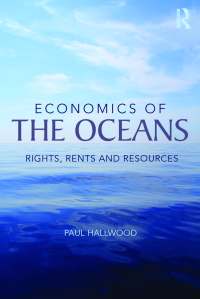You are currently browsing the monthly archive for September 2013.
 Routledge is publishing Professor Paul Hallwood‘s book, Economics of the Oceans, due out in February 2014.
Routledge is publishing Professor Paul Hallwood‘s book, Economics of the Oceans, due out in February 2014.
On the Contents page Hallwood writes:
On the surface of the blue-green planet people have fought over the green bits for ages. However, because they didn’t seem worth fighting over, they hardly bothered with the blue bits. Strange as it might seem, the green bits are mainly well tended while the blue bits are in awful disrepair. Why is this? Let’s see if we can find out.
He then attempts to answer this question in 23 chapters using the tools of environmental economics, natural resource economics, and law and economics.
Professor Jorge Agüero has been awarded a small grant from the Inter American Development Bank (based in Washington, D.C.) for his project “Long-Term Effect of Climate Change on Health: Evidence from Heat Waves in Mexico.
Abstract
I use random year-to-year variation in temperature to estimate the long-term effects of climate change on health outcomes in Mexico. Using temperature data at the district level and three rounds of nationally representative household surveys, I match an individual’s health as an adult with the history of heat waves in each stage of her life cycle until adulthood. This provides a sample of over 75,000 individuals born between 1960 and 1990. The richness of the data allows me to contribute to the existing literature in several ways. First, I use temperature data within states, which permits a more precise estimation of the effect of climate change. Second, I estimate the long-term effects by examining whether exposure to extreme temperatures early in life affects adult health. Third, the model permits the comparison of exposure early in life vis-à-vis later periods, allowing me to identify the critical health periods with respect to temperature. Finally, the project will explore heterogeneous effects by gender, location, poverty level of the area, and access to resources. The results of this investigation will provide academics and policy makers with the most comprehensive analysis about the long-term effects of climate change on health outcomes in the region.
More info to come as the project moves forward.
Congratulations, Professor Agüero.
 Professor Kai Zhao has had his article titled “War Finance and the Baby Boom” for publication in Review of Economic Dynamics.
Professor Kai Zhao has had his article titled “War Finance and the Baby Boom” for publication in Review of Economic Dynamics.
The abstract of the article is below.
In this paper, I extend the Barro-Becker model of endogenous fertility to incorporate specific fiscal policies and use it to study the effects of the fiscal policy changes following WWII on fertility in the United States. The US government went through large changes in fiscal policy after the beginning of WWII. The marginal income tax rate for an average American jumped from 4% on average before 1940 to approximately 25% during the war and stayed around 20% afterwards. The government debt-GDP ratio jumped from approximately 30% on average before WWII to 108% in 1946 and then dropped gradually in the following two decades to about 30% again at the end of 1960s. I find that the dramatic increase in the marginal income tax rate was an important cause of the postwar baby boom in the US because it lowered the after-tax wage and thus the opportunity cost of child-rearing. I also find that the differential change in taxes by income was an important reason why the baby boom was more pronounced among richer households (as documented by Jones and Tertilt (2008)). Furthermore, I argue that the government’s debt policy may also matter for understanding fertility choices because government debt implies a tax burden on children in the future and thus affects their utility, which is a key determinant of current fertility choice in the Barro-Becker model. The results of a computational experiment show that the US government’s postwar debt policy also contributed to the baby boom, but its quantitative importance is relatively small.
The article in its entirety may be read on the Economics Department’s Working Paper Series.
